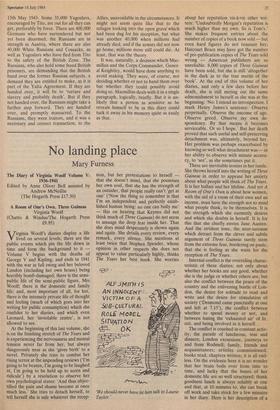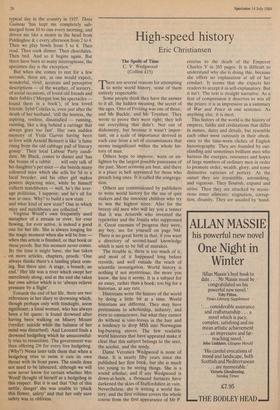No landing place
Mary Furness
The Diary of Virginia Woolf Volume V: 1936-1941 Edited by Anne Oliver Bell assisted by Andrew McNeillie (The Hogarth Press £17.50)
A Room of One's Own. Three Guineas Virginia Woolf (Chatto & Windus/The Hogarth Press £9.95) Wirginia Woolf's diaries display a life V lived on several levels; there are the public events which pin the life down in time and form the background to it Volume V begins with the deaths of George V and Kipling, and ends in 1941 with the war in full swing and her beloved London (including her own house) being horribly bomb-damaged; there is the semi- public life of the semi-public figure, Mrs Woolf; there is the domestic and family life; and, most important of all, for her, there is the intensely private life of thought and feeling (much of which goes into her writing for public consumption) which she confides to her diaries, and which even Leonard, her 'inviolable centre', is not allowed to see.
At the beginning of this last volume, she is on the finishing stretch of The Years and is experiencing the nervousness and mental tension never far from her, but always dangerously near as she 'gives birth' to a novel. Privately she tries to combat her rising terror at the impending reviews (`I'm going to be beaten, I'm going to be laughed at, I'm going to be held up to scorn and ridicule') by a resolution to observe her own psychological states: 'And thus objec- tified the pain and shame become at once much less.' She tries to detach herself, to tell herself she is safe whatever the recep- tion, but her protestations to herself that she doesn't mind, that she possesses her own soul, that she has the strength of an outsider, that people really can't 'get at one' (`Now the thing to remember is that I'm an independent and perfectly estab- lished human being: no one can bully me' — this on hearing that Keynes did not think much of Three Guineas) do not seem to assuage the deep fear inside her. That she does mind desperately is shown again and again. She details every review, every remark, every silence. She mentions at least twice that Stephen Spender, whose opinion in other respects she does not appear to value particularly highly, thinks The Years her best book. She worries 'We should never have let him talk to Laurie Taylor.' about her reputation vis-à-vis other wri- ters: 'Undoubtedly Morgan's reputation is much higher than my own. So is Tom's.' She makes frequent entries :about the number of copies of a book now sold — but even hard figures do not reassure her; Harcourt Brace may have got the number of pre-publication copies of The Years sold wrong — American publishers are so unreliable. 8,000 copies of Three Guineas have been sold, but she is still 'altogether in the dark as to the true merits of the book'. At the end of this volume of her diaries, and only a few days before her death, she is still meting out the same admonishment to herself as she was at the beginning: `No: I intend no introspection. I mark Henry James's sentence: Observe perpetually. Observe the oncome of age. Observe greed. Observe my own de- spondency. By that means it becomes serviceable. Or so I hope.' But her death proved that such useful and self-preserving detachment was, ultimately, beyond her. Her problem was perhaps exacerbated by knowing so well what detachment was — in her ability to observe with minute accura- cy, to 'see', as she sometimes put it.
There are inevitable ironies in her tussle. She throws herself into the writing of Three Guineas in order to appease her anxiety about what people will think of The Years. It is her ballast and her lifeline. And yet A Room of One's Own is about how women, with the aid of a room of their own and an income, must have the strength not to mind what people think, to be themselves. It is the strength which she earnestly desires and which she doubts in herself. It is for this that she chiefly envies Jane Austen. And the strident tone, the near-sarcasm which detract from the clever and subtle argument of Three Guineas surely stem from the extreme fear, bordering on panic, that she is feeling as she waits for the reception of The Years.
Internal conflict is the overriding charac- teristic of these diaries; not only about whether her books are any good, whether she is the judge or whether others are, but also the conflict between the peace of the country and the enlivening bustle of Lon- don, the desire for solitude to read and write and the desire for stimulation of society (Desmond came punctually at one and left at 7.15'), the conflict between whether to spend money or not, and between hating the 'exhausted air' of lit. crit. and being involved in it herself.
The conflict is couched in constant activ- ity; the parade of luncheons, teas and dinners; London excursions, journeys to and from Rodmell; family, friends and acquaintances; articles commissioned, books read, chapters written; it is all end- less. On the evidence here it is no wonder that her brain boils over from time to time, and lucky that the bones of her domestic life are so well structured; thank goodness lunch is always reliably at one and that, at 10 minutes to, she can break off work and take stock for a few minutes in her diary. Here is her description of a typical day in the country in 1937: Three Guineas 'has kept me completely sub- merged from 10 to one every morning; and driven me like a motor in the head from Piddinghoe & c every afternoon from 2 to 4. Then we play bowls from 5 to 6. Then read. Then cook dinner. Then chocolates. Then bed. And so it begins again. But there have been so many interruptions, the specimen day is the exception.'
But when she comes to rest for a few seconds, there are, as one would expect, wonderful, vivid, accurate and perceptive descriptions — of the weather, of scenery, of social occasions, of loved old friends and their foibles ('Morgan lost his spectacles found them in a book'), of less loved. friends: Sybil Colefax is, even just after the death of her husband, 'still the hostess, the aspiring, restless, dissatisfied — running, running, like a dog behind a carriage that always goes too fast'. Her own sudden memory of Viola Garvin having been in love with Arnold Bennett is like 'a fume rising from the old cabbage pail of literary gossip'. Their local Labour Party candi- date, Mr Black, comes to dinner and 'has the brains of a rabbit . . . will only talk of his daughter's pet mice — she breeds many coloured mice which she sells for 5d to a local breeder, and his other girl makes posters depicting mice, while he himself collects matchboxes — well, he's the aver- age politician, I suppose; and he's all for war at once. Why? to build a new state . . . and what kind of new state? One in which mice and matchboxes are collected.'
Virginia Woolfs own frequently used metaphor of a stream or river, for ever flowing, for ever active, is indeed a good one for her life. She is always longing for the magic moment when she will be free when this article is finished, or that book or these proofs. But this moment never comes. By the time it might have, she has taken on more articles, chapters, proofs. 'One always thinks there's a landing place com- ing. But there aint. A stage. a branch, an end.' Her life was a river which swept her mercilessly along, and at the end she takes her own advice which is to 'always relieve pressure by a flight'.
Towards the end of her life, there are two references in her diary to drowning which, though perhaps only with hindsight, seem significant; a local woman, who has always been a bit queer, is found drowned after having been walking on Misery Mount (verdict: suicide while the balance of her mind was disturbed). And Leonard finds a drowned hedgehog which he unsuccessful- ly tries to resuscitate. The government was then offering 2/6 for every live hedgehog. (Why?) Nessa later tells them that when a hedgehog tries to swim it cuts its own throat with its front paws. The simile does not need to be laboured, although we will now never know for certain whether Mrs Woolf thought of herself as a hedgehog in this respect. But it is sad that 'Out of this nettle, danger' she was unable to 'pluck this flower, safety' and that her only sure safety was in oblivion.















































 Previous page
Previous page